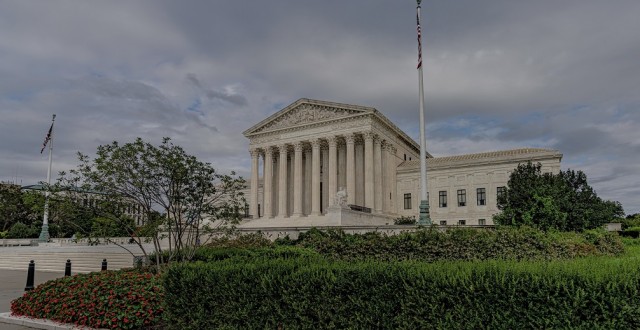
- Mediation
- Arbitration
- Court Neutrals
- Online Dispute Resolution
- Technology
- Court Decisions
- More
- Legislation
- Healthcare
- Guest Posts
- John DeGroote
- John C. Fleming
- Rick Freeman
- Professor Peter Friedman
- Honorable W. Royal Furgeson, Jr.
- James M. Gaitis
- Laura A. Kaster
- Professor John Lande
- Philip J. Loree, Jr.
- Michael McIlwrath
- F. Peter Phillips
- Professor Alan Scott Rau
- Professor Thomas J. Stipanowich
- Professor S.I. Strong
- Richard Webb
- Glen M. Wilkerson
- International arbitration
- Regulation
- Sports and Entertainment
 JAMS Welcomes Karl Bayer to its Panel of NeutralsJAMS, the world’s largest private alternative dispute resolution (ADR) provider, is pleased to announce that Karl Bayer
JAMS Welcomes Karl Bayer to its Panel of NeutralsJAMS, the world’s largest private alternative dispute resolution (ADR) provider, is pleased to announce that Karl Bayer Class Action Waivers in Arbitration Agreements: The Twenty-First Century Arbitration Battleground and Implications for the EU CountriesLinda S. Mullenix, Morris & Rita Atlas Chair in Advocacy at the University of Texas School of Law, has written “Class Ac
Class Action Waivers in Arbitration Agreements: The Twenty-First Century Arbitration Battleground and Implications for the EU CountriesLinda S. Mullenix, Morris & Rita Atlas Chair in Advocacy at the University of Texas School of Law, has written “Class Ac Picking the Proper Technological Tool for Problem-Solving in ArbitrationProfessor Amy J. Schmitz, John Deaver Drinko-Baker & Hostetler Chair in Law and Co-Director of the Translational Data An
Picking the Proper Technological Tool for Problem-Solving in ArbitrationProfessor Amy J. Schmitz, John Deaver Drinko-Baker & Hostetler Chair in Law and Co-Director of the Translational Data An SCOTUS to Resolve Circuit Split Over Transportation Worker Exemption in the FAAToday marks the start of the United States Supreme Court’s new term. During the term, the nation’s highest court will re
SCOTUS to Resolve Circuit Split Over Transportation Worker Exemption in the FAAToday marks the start of the United States Supreme Court’s new term. During the term, the nation’s highest court will re
Recent Posts
NLRB Judge Rules Houston-Based Restaurant Chain’s Collective Action Ban Violates NLRA
Last week, a National Labor Relations Board (“NLRB”) administrative law judge ruled that a Houston-based restaurant chain violated Section 8(a)(1) of the National Labor Relations Act (“NLRA”) when it required workers to sign a mandatory arbitration agreement that included a collective action waiver.
Continue reading...Class Actions and Executive Power
Zachary D. Clopton, Assistant Professor of Law at Cornell Law School, has published “Class Actions and Executive Power,” New York University Law Review, Forthcoming; Cornell Legal Studies Research Paper No. 16-44.
Continue reading...Online Dispute Resolution: Stinky, Repugnant, or Drab
Professor Robert Condlin, University of Maryland Francis King Carey School of Law, has written an interesting paper entitled, “Online Dispute Resolution: Stinky, Repugnant, or Drab,” U. of Maryland Legal Studies Research Paper No. 2016-40.
Continue reading...Wells Fargo Asks Federal Court to Send Class-Action Lawsuit Over Unauthorized Customer Accounts to Arbitration
Last week, San Francisco-based bank Wells Fargo reportedly asked a federal judge in Utah to send a proposed class-action lawsuit that was recently filed against the company to arbitration.
Continue reading...Arbitration
In National Railroad Passenger Corporation v. Fraternal Order of Police, Lodge 189, No. 16-7004 (DC Cir., April 28, 2017), the United States Court of Appeals for the District of Columbia Circuit affirmed a trial court’s order vacating an arbitration award based on public policy grounds.
Continue reading...Mediation
By Peter S. Vogel Allison O. Skinner is an attorney and full-time mediator at Sirote & Permutt and has written two outstanding articles about resolving eDiscovery disputes as a Mediator to develop a “Mediated Discovery Plan.” What a great way to help parties take advantage of the mediation process to reduce the out of control costs of eDiscovery and at the same time reach an amicable plan to deal with eDiscovery. Allison has setup a great model that will surely be widely adopted. Allison’s Strategy In a great article entitled “The Role of the Mediation for ESI (Electronically Stored Information) Disputes” Allison describes a straight-forward roadmap of how mediation can resolve eDiscovery disputes. She lists a number of benefits: self-direct workable solutions, define scope parameters, determine relevancy, create timelines for production or “e-depositions,” propose confidential compromises, create efficiencies with a mutual discovery plan, set guidelines for asserting violations of the plan, create boundaries for preservation, avoid spoliation pitfalls, manage protection of privileged information, maintain credibility with the court, avoid court-imposed sanctions, and allocate costs. “How to Prepare an E-Mediation Statement for Resolving E-Discovery Disputes” will help all lawyers who want to resolve eDiscovery disputes using the mediation process, and allowing Judges to not have to split the baby on ESI which they may not even understand. eMediation Will Work if the Mediators Understand ESI Disputes Allison’s great idea is destine to change ESI disputes, but only if the Mediators understand eDiscovery. To be successful with eMediation the Mediator must be able to communicate clearly and simply with the IT folks who manage the ESI, and at the same time Mediator can help educate the lawyers about what makes sense in their case. Before Judges appoint Mediators (and lawyers who volunteer names of Mediators) a determination should be made if the proposed Mediator has sufficient the IT technical skills and eDiscovery experience to make eMediation a successful effort. Stay tuned for Allison’s plan to revolutionize eDiscovery!!! Technorati Tags: ADR, law, mediation, e-discovery Peter S. Vogel is a trial partner at Gardere Wynne Sewell LLP where he is Chair of the Electronic Discovery Group and Co-Chair of the Technology Industry Team. Before practicing law he worked as a computer programmer, received a Masters in Computer Science, and taught graduate courses in information systems. For 12 years he served as the founding Chair of the Texas Supreme Court on Judicial Information Technology which is responsible for helping automate the Texas court system and putting Internet on the desktops of all 3,200 judges. Peter has taught courses on the Law of eCommerce at the SMU Dedman School of Law since 2000. Many of Peter’s topics are discussed on his blog www.vogelitlawblog.com.
Continue reading...Healthcare Disputes
Legal Research
About Disputing
Disputing is published by Karl Bayer, a dispute resolution expert based in Austin, Texas. Articles published on Disputing aim to provide original insight and commentary around issues related to arbitration, mediation and the alternative dispute resolution industry.
To learn more about Karl and his team, or to schedule a mediation or arbitration with Karl’s live scheduling calendar, visit www.karlbayer.com.














